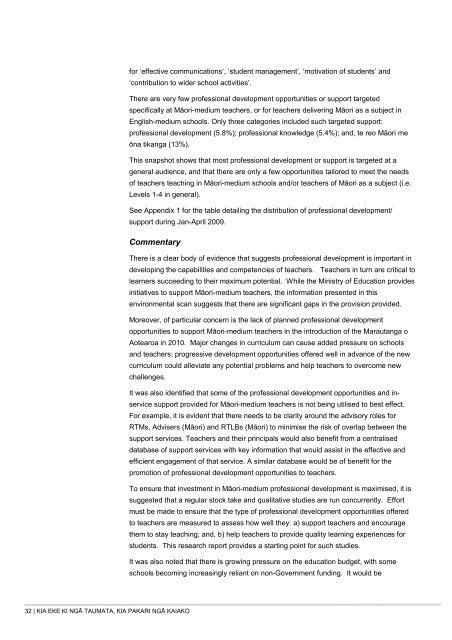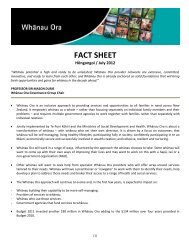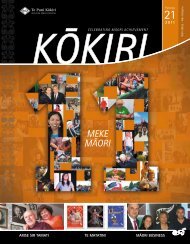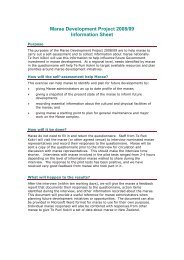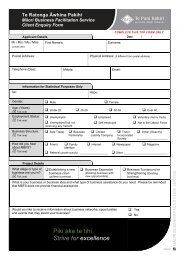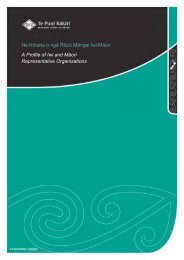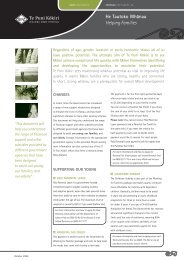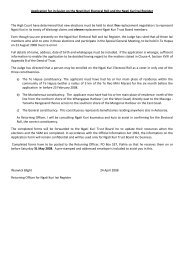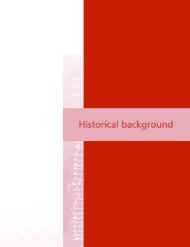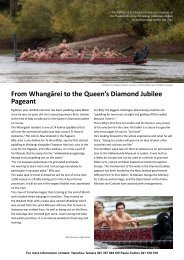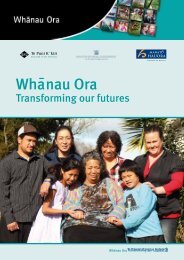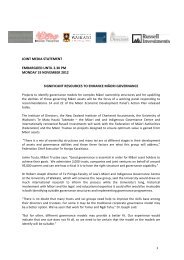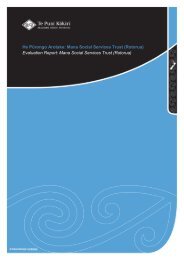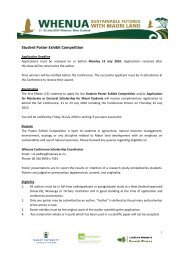Kia eke ki ngÄ Taumata, kia Pakari ngÄ Kaiako He ... - Te Puni Kokiri
Kia eke ki ngÄ Taumata, kia Pakari ngÄ Kaiako He ... - Te Puni Kokiri
Kia eke ki ngÄ Taumata, kia Pakari ngÄ Kaiako He ... - Te Puni Kokiri
Create successful ePaper yourself
Turn your PDF publications into a flip-book with our unique Google optimized e-Paper software.
for ‘effective communications’, ‘student management’, ‘motivation of students’ and‘contribution to wider school activities’.There are very few professional development opportunities or support targetedspecifically at Māori-medium teachers, or for teachers delivering Māori as a subject inEnglish-medium schools. Only three categories included such targeted support:professional development (5.8%); professional knowledge (5.4%); and, te reo Māori meōna tikanga (13%).This snapshot shows that most professional development or support is targeted at ageneral audience, and that there are only a few opportunities tailored to meet the needsof teachers teaching in Māori-medium schools and/or teachers of Māori as a subject (i.e.Levels 1-4 in general).See Appendix 1 for the table detailing the distribution of professional development/support during Jan-April 2009.CommentaryThere is a clear body of evidence that suggests professional development is important indeveloping the capabilities and competencies of teachers. <strong>Te</strong>achers in turn are critical tolearners succeeding to their maximum potential. While the Ministry of Education providesinitiatives to support Māori-medium teachers, the information presented in thisenvironmental scan suggests that there are significant gaps in the provision provided.Moreover, of particular concern is the lack of planned professional developmentopportunities to support Māori-medium teachers in the introduction of the Marautanga oAotearoa in 2010. Major changes in curriculum can cause added pressure on schoolsand teachers; progressive development opportunities offered well in advance of the newcurriculum could alleviate any potential problems and help teachers to overcome newchallenges.It was also identified that some of the professional development opportunities and inservicesupport provided for Māori-medium teachers is not being utilised to best effect.For example, it is evident that there needs to be clarity around the advisory roles forRTMs, Advisers (Māori) and RTLBs (Māori) to minimise the risk of overlap between thesupport services. <strong>Te</strong>achers and their principals would also benefit from a centraliseddatabase of support services with key information that would assist in the effective andefficient engagement of that service. A similar database would be of benefit for thepromotion of professional development opportunities to teachers.To ensure that investment in Māori-medium professional development is maximised, it issuggested that a regular stock take and qualitative studies are run concurrently. Effortmust be made to ensure that the type of professional development opportunities offeredto teachers are measured to assess how well they: a) support teachers and encouragethem to stay teaching; and, b) help teachers to provide quality learning experiences forstudents. This research report provides a starting point for such studies.It was also noted that there is growing pressure on the education budget, with someschools becoming increasingly reliant on non-Government funding. It would be32 | KIA EKE KI NGĀ TAUMATA, KIA PAKARI NGĀ KAIAKO


